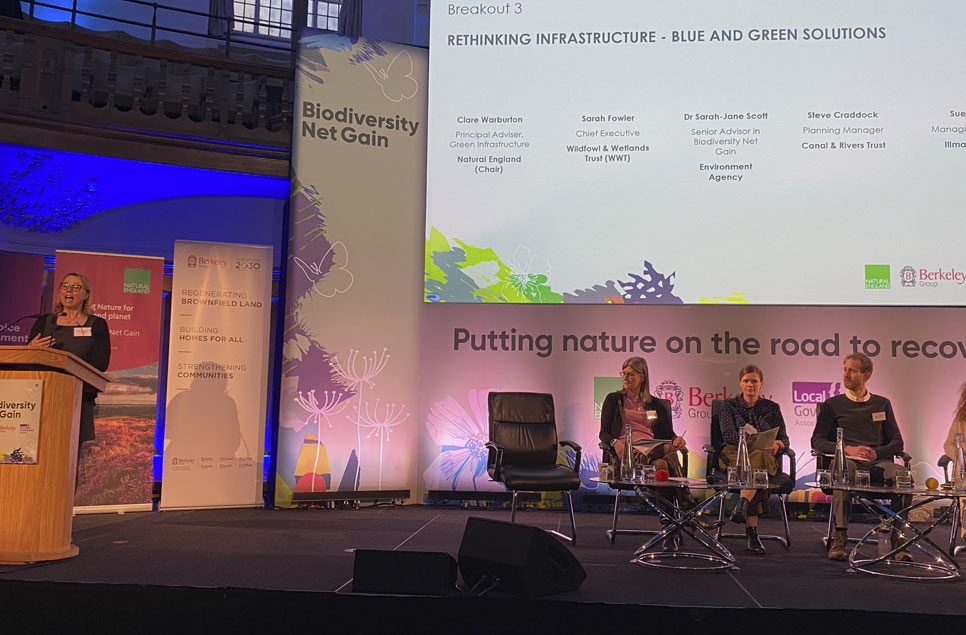Biodiversity Net Gain: As new rules for developers that could help wetlands are introduced, Sarah Fowler addresses key conference
2nd March saw WWT Chief Executive Sarah Fowler speak alongside a panel of experts on new rules requiring developers to leave biodiversity in a better state than they found it that could help boost wetland nature.

The conference, hosted by Blue Recovery Leaders Group members Berkeley Group, alongside Natural England and the Local Government Association, saw experts from national and local government, environmental NGOs and the development sector come together to discuss biodiversity net gain (BNG).
Biodiversity Net Gain is a new law coming into force in November 2023 that will require all new developments in England to increase biodiversity by 10% relative to existing nature on the development site. This can be achieved either by creating new habitats on site or investing in habitat creation elsewhere.
The conference comes shortly after the Government published the rules and regulations which set out exactly how BNG will work. As Sarah set out at the conference, BNG is a potentially powerful tool for restoring nature, including wetlands. Delivered well BNG can be an important tool to drive real gain in recovering nature and stemming the loss in biodiversity we have seen in the past 50 years.
The new law would also mean any habitats destroyed will normally have to be replaced with habitat of the same or better quality. This means most wetlands will have to be replaced with new wetlands that are at least as biodiverse. How the policy is implemented will be key to whether benefits for nature are truly realised.
Berkeley’s Kidbrooke Village is a good example of how BNG can deliver benefits for people and nature. The next few years will be crucial in making sure all developments protect existing wetlands where possible and maximise benefits for people and nature from new wetlands. The conference was a fantastic early opportunity to make sure wetlands are at the heart of this new policy and it was encouraging to see so many key stakeholders hear Sarah speak.
WWT’s Chief Executive Sarah Fowler said:
“Biodiversity net gain has the potential to significantly stem wetland loss while delivering multiple benefits for people, such as reduced flood risk, carbon storage, cleaner water and boosts to wellbeing. However, how it is implemented is key, including getting the rules and regulations right and developers and local planning authorities skilling up to deliver. Of concern is that, under the rules as they stand, when developers create a wetland they will be able to count its benefits twice: once to meet BNG requirements and once to meet requirements not to pollute water with nutrients. Tweaks to remove this double counting are essential to ensure BNG truly delivers a net gain for wetlands. WWT will be closely monitoring BNG’s national implementation to ensure it delivers for wetlands and is truly a charter to support nature’s recovery”
Rob Perrins, Chief Executive, Berkeley Group, said:
“We’re passionate about regenerating underused brownfield sites to create the welcoming and sustainable places local communities need. We’ve learnt that weaving blue and green infrastructure through these new neighbourhoods, including a mix of wetland habitats, is hugely beneficial, particularly in the urban areas where nature and biodiversity is so depleted and fragmented. As members of the Blue Recovery Leaders Group we want other developers to embrace wetland creation and are delighted Sarah Fowler and the WWT team are joining this conference to share their passion and expertise with the industry.”



